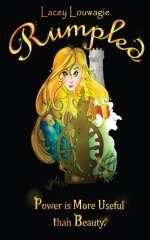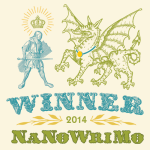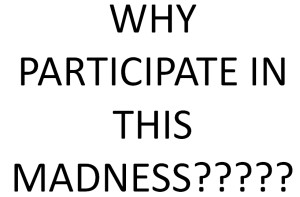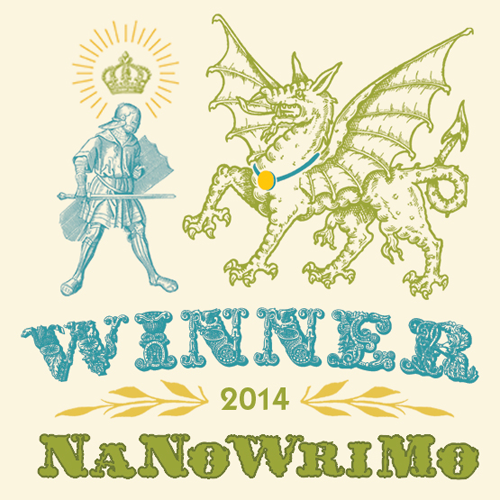Lacey Louwagie's Blog, page 10
January 2, 2015
Advice I Need to Put in Practice …
“I’m saying that you should send out, today, the best work you are capable of doing today. Of course you’ll do better a year from now. But a year from now you should be writing the story that you care about and believe in at that time — not reworking THIS year’s story.
You grow a whole lot more as a writer by getting old stories out of the house and letting new ones come in and live with you until they grow up and are ready to go. Don’t let the old ones stay there and grow fat and cranky and eat all the food out of the refrigerator. You have dozens of generations of stories inside you, but the only way to make room for the new ones is to write the old ones and mail them off. ” – Orson Scott Card, How to Write Science Fiction & Fantasy
December 29, 2014
2014: My Writing Year in Review
It’s easy for me to get discouraged with how long some of my writing projects take. I will be finishing up my second

Photo credit: Philip Chapman-Bell
year of revising my Rapunzel retelling in 2015, and I always want to be writing more than I actually am. But when I paused to take stock of what has happened in my writing life this year, I realize that I have been writing all year, and that projects take me longer because I’ve diversified how I spend my writing time. Here are the highlights.
January – My husband and I took a three-day retreat at Pine Rest Cabins, where I began preparing to self-publish Rumpled.
February – I began the practice of Morning Pages — writing 3 pages in my journal every morning. I’ve been doing it about 4 times a week ever since.
 March – I published Rumpled, and I traveled to Dayton, Ohio to do a reading of my essay “Where I First Met God,” which was published in Unruly Catholic Women Writers. (Later in the year, it also appeared in Living True: Lesbian Women Share Stories of Faith.)
March – I published Rumpled, and I traveled to Dayton, Ohio to do a reading of my essay “Where I First Met God,” which was published in Unruly Catholic Women Writers. (Later in the year, it also appeared in Living True: Lesbian Women Share Stories of Faith.)
April – I finished my year-long journaling project, A Year in the Life, and I started a Writing as a Spiritual Practice group at my church.
May – I had to practice what I preached and rely on the healing power of writing as I wrote and cried myself through saying goodbye to my beloved cat, Phoebe, who died on May 30.
June – I began writing Phoebe’s life story in my Pet Remembrance Journal.
August – The news organization I work for ramped up its news coverage, so I’ve written a lot more stories for pay than I usually do. My favorite was this story about voting rights on a Sioux reservation.
September – I attended a phenomenal Master Plot Workshop with Cheryl Klein. Putting my middle grade novel through her rigorous editing prescription is one of my goals for 2015. I was also featured in the September/October issue of New Moon Girls, with a bit of advice to girls about self publishing.
October – I gave a presentation at my local library with tips for NaNoWriMo, then gave the same presentation at the beginning of November at a different branch. I also went on a writer’s pilgrimage to the East Coast to see the Emily Dickinson Museum.
 November – I wrote my 6th NaNoWriMo novel, which is both a sequel to Rumpled and a retelling of Hans Christian Andersen’s “The Snow Queen.”
November – I wrote my 6th NaNoWriMo novel, which is both a sequel to Rumpled and a retelling of Hans Christian Andersen’s “The Snow Queen.”
December – My Booklikes blog topped 500 readers, and I set up a blog for one of my 2015 writing projects, A Year in Disney Movies.
I also continued to write for Young Adult Catholics, where my post about Natural Family Planning continues to be the most-viewed entry, and I read over 100 books, including the following writing-related ones:
Fangirl by Rainbow Rowell, which stars a fan-fiction writing narrator (5/5 stars).
The Right to Write by Julia Cameron, which is what started me on Morning Pages (5/5 stars).
Publishing Ebooks for Dummies by Ali Luke, which was a great resource as I got Rumpled out into the world (4/5 stars)
I Capture the Castle by Dodie Smith, which I like primarily because it is a “self-aware” book, in which the narrator’s writing process is as authentic as the adolescent feelings depicted therein (4/5 stars).
Unruly Catholic Women Writers, see above (4/5 stars)
Shaggy Muses: The Dogs that Inspired Elizabeth Barrett Browning, Emily Bronte, Emily Dickinson, Edith Wharton, and Virginia Woolf by Maureen Adams, which showed me that, as a dog-owner and a writer, I am in very good company! (4/5 stars)
Belzhar by Meg Wolitzer, in which a group of teens finds literal transformation and healing through writing in their journals (3/5 stars).
A Year in the Life: Journaling for Self Discovery by Sheila Bender, see above (3/5 stars).
The Creative Life: True Tales of Inspiration by Julia Cameron, which was probably the most disappointing book I read all year, partly because The Right to Write gave me high expectations (2/5 stars).
My writing goals for 2015 are to finish revising my Rapunzel story, do another edit on my middle grade novel (which has been “tabled” for a couple of years), and finish writing Phoebe’s life story. I’m looking forward to seeing what other writing adventures 2015 has in store for me.
Happy New Year!
December 22, 2014
Writing Related Book Review: Belzhar by Meg Wolitzer
 Belzhar by Meg Wolitzer
Belzhar by Meg Wolitzer
My rating: 3 of 5 stars
I’ve long believed that through writing, we have the power to transform ourselves and our experiences. It’s why I journal every morning, even when there are a million other things waiting to get done; it’s why I’ve taught writing classes to kids, teens, and senior citizens; and it’s why I wanted to read this book the moment I read my first review about it.
It rests on the concept that when a group of traumatized teens write in these certain journals, they are transported to an alternate reality where they can get back something they have lost. For the main character, that is the chance to spend time with her boyfriend who has died. The other four teens in her class who also have the journals have their own experiences to work through various traumas.
There are certain rules to this place, such as that it takes five pages of writing every time you make a trip there, and that you can’t do anything there you haven’t actually done in real life. These rules imposed a constraint on the experience that made me feel as if the characters should quickly get tired of it and itch to allow their real lives to unfold, but all of them stayed attached to the idea of returning to Belzhar throughout the entire semester. I liked the metaphor about the way writing can allow you to escape and also to face your demons, but I was hoping for more commentary about how or why visiting Belzhar was helpful to these students, and what might make them ready to live in the real world after spending two days there a week. The main character felt real to me, even her somewhat exaggerated heartbreak over a relationship she lost after only 42 days — there is, after all, a certain amount of lost hopes in something that ends so abruptly that must be grieved — but the rest of the characters seemed to come just shy of feeling fully fleshed out. As an author primarily known for her books for adults, something about Belzhar felt a little self-conscious to me, as if Wolitzer were trying just a little too hard to get this teen thing right. The class instructor felt a little too wise, the students a little too reverent and earnest. And it was as if the whole world outside of this one particular class didn’t even exist — I don’t remember any mention of other classes or other students aside from the mc’s roommate and her forced extracurricular participation in a singing group.
I also felt that family threads were left unresolved, particularly the one involving the younger brother.
There was a little bit of a twist at the end, which I liked.
The truth is, this book is leagues better than a lot of other books I’ve also rated three stars. I just think that, with a subject that is so dear to me, I expected a whole lot more.
View all my reviews
December 15, 2014
Creating Characters — Making a Model
Last week I listened to this podcast from Writing Excuses, in which Corey Doctorow talks about the neuroscience of creating (and relating to) characters. Writing Excuses is a great podcast, but this is the first episode that really blew me away. It’s 15 minutes long, and I recommend you give it a listen if you write, or even if you just like to read fiction.
Doctorow talks about how, as we write, our subconscious begins creating a “model” of our characters. We already have “models” in our heads of the people we know in real life. That’s what allows us to accurately predict whether someone will like a certain gift, or how they will react to certain news, even if they aren’t there to confirm it. So the more we write about our characters, the better our model becomes, so that we can feel it when someone acts out of character — just as we might not believe it when someone tells a story about someone we know behaving in a way that contradicts our model of that person.
This podcast was a huge revelation to me. I am not someone who creates “character sketches” — I do not list my characters with their physical characteristics, their personality traits, or their likes and dislikes before I start to write. I hold it all in my head and uncover it as I write. I tend to write character-driven stories, but I sometimes second-guess how I “know” how a character will respond to a situation. And if I just keep doing what “feels right” as the scene unfolds, how do I know I’m being true to the character? And as I write more, will I run out of characters, so that they all really start seeming and acting alike?
I pondered this issue a lot while I was writing my NaNo novel, Ice Eternal. It is a sequel to Rumpled, but the point of view character is the miller’s daughter — Rumpled is written from Rumpelstiltskin’s point of view. Being within Emily’s point of view, I kept imagining her from a third-person perspective, asking myself whether this still “felt” like the same person we had seen through Rumpelstiltskin’s eyes in the first book. I eventually had to be content with the assumption that if it felt right, it was right.
This podcast reassured me that I can trust my instinct when it comes to characters, and that analyzing them too much with my conscious mind might actually hinder my process, especially during the first-draft stage. I think I can trust my beta readers, too — once in a while someone in my writer’s group will tell another member, “He doesn’t seem like the type who would do X.” This is good confirmation — you want the model you are building in your mind to match the model the reader is creating in his mind. (Corey says the act of writing is actually “transferring” a character model from your mind to someone else’s mind, which is pretty cool.)
This also explains why I am not a “plot-driven” writer — I can’t force my characters to do certain things for the sake of the plot. This can be tricky when writing retellings, when certain plot elements are expected. But now I can trust that if something feels “wrong” about the way a character acts, even if it’s something that I feel “needs” to happen in the story, it probably is wrong and I need to find a better way.
My husband and I are watching The 100 on Netflix. It drives us CRAZY because it’s totally plot driven, and the characters are absolute slaves to whatever needs to happen in the plot, to the point that their own personalities get totally pulverized in the process. It makes it hard to care about anyone on the show. Which makes it hard to care about the show. I’m curious about whether this is a shortcoming of just of the TV series, or whether it’s a carry-over from the book. Whichever it is, someone along the line should have listened to this podcast — and then the little voice in their writing head that screamed, “No!!!” before they mutilated their characters into fitting with the desired plot.
December 9, 2014
Young Adult Catholics: On Suffering
My most recent post, On Suffering, is up at the Young Adult Catholics blog. Bit by bit, I am returning to the varied writing life I knew before November came along.

This guy always knows what he’s talking about.
December 8, 2014
NaNoWriMo: Why I Did It
This is the NaNoWriMo post I wanted to write last week, but I was just too tired.
And I think this will be my last post dedicated to NaNoWriMo until next November. I’m still not recovered enough to regain my regular writing “discipline.”
At the end of my NaNo presentation, I have a slide that asks:
No one forces you to do NaNoWriMo. You don’t win money or even much recognition. Nothing bad happens if you don’t do it. It’s stressful, and it can take its toll on your relationships, your housekeeping, your work, and your sanity. So why do I keep going back?
When I gave the presentation, I said it was because there was something magical about the immersive experience that comes from working on the same story every day, and carving out time for writing when you wouldn’t in your “normal” life (sneaking away from Thanksgiving socializing, for example). I said it was because I don’t like writing first drafts, and NaNo allows me to write them quickly and just get them out of the way so I can spend the rest of my writing time revising, which I like more.
But it wasn’t until about halfway through the month that I started to gain a deeper understanding of what NaNoWriMo really means to me.
I started NaNoWriMo because I was in need of a new writing project in 2005, and it was so exhilarating to learn that I could actually do it that I did it again in 2006. That was a hard year, but once you’ve done something twice, it has the makings of a tradition. And so I found myself sometimes yearning for it in much the same way one yearns for Christmas dinner with the family the first time it snows every year.
Although I don’t do NaNoWriMo every year, I do it enough that it’s becoming embedded into the normal flow of my life. And like any tradition, it helps me remember who I am. 
When I was a child, I hated change. I resisted the transitions in identity that came too often and too fast and without my consent (ahem, puberty). But one part of my identity that hasn’t changed since I was 10 years old (not even with puberty!) was that I consider myself a writer. I went from being a student to a full-time employee to a freelancer to someone who lived alone to a girlfriend to a fiance to a wife. Other identities have endured, of course, as I’ve remained a friend, a sister, a daughter, etc. But those identities feel like defaults, like givens. My identity as a writer, like my identity as a wife and as a freelancer, is a chosen identity. And I choose it again each time I make a new commitment to my writing.
Much in the way a married couple might celebrate their anniversary, NaNoWriMo gives me that yearly reminder that, yes, I’m still in this. My life keeps changing, I may be living in different cities, living with different people, working different jobs — but November reminds me that I am still a writer in spite of that. Each year that I take on NaNoWriMo, I remember every year that I’ve done it before, and I can’t help but reflect on all the places and situations NaNoWriMo has found me in.
In 2005, living in a huge apartment converted from classrooms with my best friend and two cats, working a traditional 9-5 job and squeezing in writing sessions before I went to work in the morning and again when I came home at night.
In 2006, the same apartment, the same job, the same cats, the same roommate, but a better laptop, which allowed me to write in cafes and on my bedroom floor rather than just at my desk. This was the year I learned that 2005 was liberally infused with beginner’s luck and that NaNo could be damn hard. It’s also the only year I’ve taken a vacation day for NaNo.
In 2008, living alone now, my first month as a full-time freelancer. Those long days with tense shoulders from hunching too many hours over my computer, learning to live with the insecurity and freedom of doing something I had always dreamed of. I thought the flexibility would be good for my writing, but I worked so many hours that first year as a freelancer that I still use it as my benchmark whenever I feel stressed out now — at least I’m not still THERE. This was the first NaNo I revised extensively, and I still hope to find it a home with a publisher someday. It is also my only NaNo novel that is autobiographical.
In 2011, giving in to a friend’s pressure at the last minute and deciding to write a November novel even though I was also planning my wedding. I wrote this novel in my step-grandmother’s house, which I moved into after she went into assisted living, and in the library where I worked, and in my fiance’s half-finished house. I had left my beloved Duluth and was back in my hometown, with a dog and a clothesline and an engagement ring. This was the year my soon-to-be-husband saw the reality of NaNo for the first time — a reality he will continue to live with for many years to come.
In 2012, I was married, living in yet another house in another state. This was the year that doing NaNo felt the most affirming. Going from single to married was the biggest shift my identity had undergone since I went from girl to woman, and doing NaNo was a way that I proved to myself that I was still ME underneath it all. And what’s more, that I could bring ME to this new relationship, frantic novel writing and all. I am still revising my 2012 novel, which was a retelling of Rapunzel, and I am happy with what it was and what it is becoming.
And that brings me up to 2014, my second novel as a married woman, in the same house as in 2012, but working a different job. And this was the first time I really took part in a local NaNoWriMo community, and spent hours with a couple friends doing write-ins. That is what will mark this year’s memories of NaNoWriMo — the fact that I did it with friends, friends I had not met nor even dreamed of the last time I wrote a novel in this city.
From a productivity perspective, I’m also so glad that I wrote Ice Eternal, the sequel to Rumpled, for NaNoWriMo, because I know it would have taken me years to get to that project otherwise. Now a novel exists where there wasn’t one before, and all it took was a frenzied month to make it happen.
December 1, 2014
NaNoWriMo: Week DONE!
I had a very thoughtful post about NaNoWriMo planned out in my head, but right now my brain is just too exhausted after a long day of work to produce it. Oh, and did I mention that poor head was also responsible for writing over 50,000 words last month, the last of which were squeezed out in the in-laws’ spare bedroom, my husband’s aunt’s basement, and at a coffee shop en route from Rapid City to Sioux Falls, SD? Welcome to the world, NaNo Novel Number Six.
November 24, 2014
NaNoWriMo, Week 4: What I’m Looking Forward To
Here it is, the last week of NaNoWriMo! Somehow this month that seems both far too long and far too short always  comes to an end. My novel has about 8,000 words to go and the main dilemma is resolved. I may end up having to write some filler scenes if I get to the end before hitting 50,000. But I love knowing that I’m so close! By the time I turn in my next time card (Dec. 3), I will have my sixth NaNo novel under my belt.
comes to an end. My novel has about 8,000 words to go and the main dilemma is resolved. I may end up having to write some filler scenes if I get to the end before hitting 50,000. But I love knowing that I’m so close! By the time I turn in my next time card (Dec. 3), I will have my sixth NaNo novel under my belt.
These are the things I’m looking forward to doing again once November is over …
Reading all my email and not just the ones that look really high priority — and maybe even responding to a few!
Sleeping in on weekends
Doing the dishes more than once a week
Playing with my cats
Finding balance among my writing commitments again — I’m pleased that I’ve managed to keep up with this blog and with my journaling during NaNoWriMo, but the same cannot be said for my book reviews or the Young Adult Catholics blog
Seeing if I can find my desk again
Putting my laundry away rather than just digging for it in the basket
Packing up my summer clothes (I’m not in denial, just behind schedule)
Being able to NOT write once in a while
Finishing my Rapunzel story, and, of course …
Revising my new novel!!
November 20, 2014
NaNoWriMo Week 3: In Which I Fall Behind
Here I am on Week 3, and I have fallen behind — it’s always my goal to attempt to keep up with my regular writing commitments (journaling, blogging, reviews) while I’m doing NaNoWriMo, but if I have to choose, I choose my novel. November only comes once a year, after all.
This has been a rough week — I’ve been swamped with freelance work and stealing 45 minutes a day to novel anyway. That’s why my usual Monday blog post is appearing on … Thursday!
The above is a slide from the NaNoWriMo presentation I gave at two libraries at the beginning of the month. It’s to prepare novelists for the fact that almost EVERY person writing a novel feels like giving up in the middle. The beginner’s energy has worn out, and you realize you’ve actually got to get some sort of plot going … and then you have to resolve it. There’s a lot of pressure and confusion and, yes, despair, in the middle of a novel.
I also included the slide to let folks who have found themselves giving up on novels in the middle, or starting multiple novels never to finish any, know that the desire to give up in the middle is normal. Professional and amateur writers alike encounter it.
I encountered it last week and at the beginning of this week.
I very seriously considered giving up during that time, especially at the beginning of this week when I was overwhelmed with a work project. I mean, nothing horrible will happen if I don’t finish my novel, right?
There are two reasons I kept going.
The “sunk cost” fallacy – the idea that I’ve already invested half a month and thousands of words in this thing, and that would somehow all be “wasted” if I gave up now; and
I knew that if I didn’t finish this novel now, I probably never will. (My incomplete novel abandoned at 50,000 words back in 2011 still haunts me.)
This is the roughest novel I’ve ever written. It’s a mess and feels aimless. It’s full of info dumps and way too many descriptions of cold weather. I wander around in the dark during my writing sessions hoping that I’ll bump into something resembling a plot development. The moments of inspiration in the shower end up being good for only 400 words. And every day I have to do it again.
But I’m going to finish because I’m beginning to get a vision for what this novel could be once it’s revised. I’ve never written anything this rough before, but I’m a damn good editor and I think I can make even this pile of words sparkle like the snow and ice that permeates the setting (it’s a retelling of “The Snow Queen.”)
And then, in the last couple days, something wonderful happened –
My attitude shifted, and I realized it was because I had arrived at “The End is In Sight!”
It is not far to “You Made It!”
Write on, fellow novelers.
November 10, 2014
NaNoWriMo Week 2: What Not to Give Up
Last week, I wrote a post with tips for clearing more time for novel writing. This post is the counterbalance to that one — these are the things I recommend you DO continue to make time for, even in the midst of your novel-writing frenzy. You’ll be glad for the investment once the madness is over in December.
Exercise – If exercise is a regular part of your life, try to keep up with it during November. It’s been a couple years since I read No Plot, No Problem, but I have a vague memory of Chris Baty suggesting giving up going to the gym during November. Here’s why I disagree: You are using your brain SO MUCH to write your novel. Your body needs a little bit of attention — but more than that, getting your body moving is a great way to process what you’re writing.
Sleep – There’s a whole NaNoWriMo culture based around excessive caffeine consumption and deficient sleep during November. Don’t let it pull you under. I’ve never pulled an all-nighter or suffered sleep deficiency in my 5+ years of NaNo-ing, and I don’t plan to start. If you are well rested, your mind will work better — and you will write better. Plus, you’ll be less likely to get sick, and getting sick can really slow you down.
Time with family and friends – You may need to scale back on your social commitments to find time for writing, but don’t neglect your most important relationships entirely. Do talk to them about what you’re doing — hopefully they will be supportive and understanding (I’ve been very lucky in this arena). Even better, see if you can convince them to join the madness with you! But the bottom line is, if you want a relationship to endure long past November, make at least some time for it now.
Dependents – If you have children, pets, or other living entities that depend on you for their mental and/or physical well-being, don’t shirk your commitments to them. My dog doesn’t care that I’m writing a novel this month — he still needs his walks. (Admittedly, he gets shorter walks, but that’s partly because of colder weather.) If you have kids and you have a partner, family, or friends who are amenable, November might be a good time to ask for a little extra help. I don’t have kids so can’t offer a ton of insight on this one — but if I do have them, I’ll check in in a few years about how to make this work! (I do have a friend who is a mother and doing NaNo with me, and she’s cruising right along.)
Your paying job/school – Sigh. Although taking some vacation time to work on your novel is perfectly acceptable, don’t fall short of making your expected commitments to your job or school. Unless you have a good backup plan (and the novel is NOT a good backup plan), you’ll want these things to still be there when November is over.
Remember, it’s only one month! Writing your novel will take a lot of your time, but not ALL of it. Be judicious about what you do with the time that remains, and it is possible to emerge sane and recognizable at the end of it all. Really!







